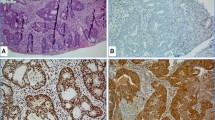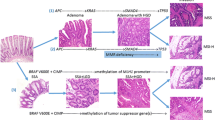Abstract
Background
We attempted to identify areas of microsatellite alterations specific to histologically normal colorectal epithelium and to clarify the correlations among those molecular events and clinicopathologic features.
Methods
We conducted a prospective observation study on 51 colorectal cancer patients. Preoperative blood and microdissected histologically normal colorectal epithelium and neoplastic tissues were collected. Microsatellite analyses with seven microsatellite loci were performed to examine the genetic potential of individual tumors and histologically normal colorectal epithelium.
Results
In the sporadic colorectal cancer group, p53 LOH in the neoplastic epithelium had a significant correlation with the maximum tumor diameter and the preoperative serum cancer antigen 19-9 level, but not with the depth of invasion of the primary tumor. Among the patients who had p53 LOH in the histologically normal colorectal epithelium, four additional tumors were discovered within 30 months after curative surgery. For those patients, microsatellite alterations in normal colorectal epithelium were more sensitive than tumor markers.
Conclusions
For accurate LOH analysis, nonmalignant lymphocytes from blood should be used as the appropriate normal DNA sample. Focusing on the identification of high-risk patients for microsatellite alterations in histologically normal colorectal epithelium can be a useful indicator of subsequent metachronous tumor development after colorectal surgery.
Similar content being viewed by others
References
Nicholl ID, Dunlop MG. Molecular markers of prognosis in colorectal cancer.J Natl Cancer Inst 1999;91:1267–9.
Naidoo R, Tarin M, Chetty R. A comparative microsatellite analysis of colorectal cancer in patients <35 years and >50 years of age.Am J Gastroenterol 2000;95:3265–75.
Yashiro M, Carethers JM, Laghi L, et al. Genetic pathways in the evolution of morphologically distinct colorectal neoplasm.Cancer Res 2001;61:2676–83.
Greenwald BD, Harpaz N, Yin J, et al. Loss of heterozygosity affecting the p53, Rb, and mcc/apc tumor suppressor gene loci in dysplastic and cancerous ulcerative colitis.Cancer Res 1992;52:741–5.
Baisse B, Bouzourene H, Saraga EP, Bosman FT, Benhattar J. Intratumor genetic heterogeneity in advanced human colorectal adenocarcinoma.Int J Cancer 2001;93:346–52.
Connolly KC, Gabra H, Millwater CJ, et al. Identification of a region of frequent loss of heterozygosity at 11q24 in colorectal cancer.Cancer Res 1999;59:2806–9.
Arrivas R, Ribas M, Risques RA, et al. Prospective assessment of allelic losses at 4p14-16 in colorectal cancer: two mutational patterns and a locus associated with poorer survival.Clin Cancer Res 1999;5:3454–9.
Vogelstein BV, Fearon RF, Hamilton SR, et al. Genetic alterations during colorectal-tumor development.N Engl J Med 1988;319:525–32.
Blum HE. Colorectal cancer: future population screening for early colorectal cancer.Eur J Cancer 1995;31A:1369–72.
Stem HS. Contributions of molecular genetics to the clinical management of colorectal cancer.Am J Surg 1996;171:10–5.
Moen CJA, Groot PC, Hart AM, Snoek M, Demant P. Fine mapping of colon tumor susceptibility (Scc) genes in the mouse, different from genes known to be somatically mutated in colon cancer.Proc Natl Acad Sci U S A 1996;93:1082–6.
Tarafa G, Villanueva A, Farre L, et al. DCC and SMAD4 alterations in human colorectal and pancreatic tumor dissemination.Oncogene 2000;19:546–55.
Hermminki A, Peltomaki P, Mecklin JP, et al. Loss of the wild type MLH1 gene is a feature of hereditary nonpolyposis colorectal cancer.Nat Genet 1994;8:405–10.
Minamoto T, Esumi H, Ochiai A, et al. Combined analysis of microsatellite instability and K-ras mutation increases detection incidence of normal samples from colorectal cancer patients.Clin Cancer Res 1997;3:1413–7.
Weber TK, Conroy J, Keitz B, et al. Genome-wide allelotyping indicates increased loss of heterozygosity on 9p and 14q in early age of onset colorectal cancer.Cytogenet Cell Genet 1999;86:142–7.
Bocker T, Schlegel J, Kullmann F, et al. Genomic instability in colorectal carcinomas: comparison of different evaluation methods and their biological significance.J Pathol 1996;179:15–9.
Kim WH, Lee HW, Park SH, Kim YI, Chi JG. Microsatellite instability in young patients with colorectal cancer.Pathol Int 1998;48:586–94.
Peelen T, Leeuw W, Van Lent K, et al. Genetic analysis of a breast-ovarian cancer family, with 7 cases of colorectal cancer linked toBRCA1, fails to support a role forBRCA1 in colorectal tumorigenesis.Int J Cancer 2000;88:778–82.
Watanabe T, Wu TT, Catalano PJ, et al. Molecular predictors of survival after adjuvant chemotherapy for colon cancer.N Engl J Med 2001;344:1196–206.
Chetty R, Naidoo R, Schneider J. Allelic imbalance and microsatellite instability of the DCC gene in colorectal cancer in patients under the age of 35 using fluorescent DNA technology.Mol Pathol 1998;51:35–8.
Vasen HF, Watson P, Mecklin JP, Lynch HT. New clinical criteria for hereditary nonpolyposis colorectal cancer (HNPCC, Lynch syndrome) proposed by the International Collaborative group on HNPCC.Gastroenterology 1999;116:1453–6.
Hecker KH, Roux KH. High and low annealing temperatures increase both specificity and yield in touchdown and stepdown PCR.Biotechniques 1996;20:478–85.
Medinz IL, Lee CCR, Wong WW, Pirkola K, Sidransky D, Mathies RA. Loss of heterozygosity assay for molecular detection of cancer using energy transfer primers and capillary array electrophoresis.Genome Res 2000;10:1211–8.
Cavenee WK, Dryja TP, Phillips RA, et al. Expression of recessive alleles by chromosomal mechanisms in retinoblastoma.Nature 1983;305:779–84.
Hahn M, Matzen SE, Serth J, Pingoud A. Semiautomated quantitative detection of loss of heterozygosity in the tumor suppressor gene p53.Biotechniques 1995;18:1040–7.
Martignetti JA, Gelb BD, Pierce H, Picci P, Desnick RJ. Malignant fibrous histiocytoma: inherited and sporadic forms have loss of heterozygosity at chromosome bands 9p21–22—evidence for a common genetic defect.Genes Chromosomes Cancer 2000;27:191–5.
Tabor MP, Brakenhoff RH, van Houten VM, et al. Persistence of genetically altered fields in head and neck cancer patients: biological and clinical implications.Clin Cancer Res 2001;7:1523–32.
Author information
Authors and Affiliations
Corresponding author
Rights and permissions
About this article
Cite this article
Koshiji, M., Yonekura, Y., Saito, T. et al. Genetic alterations in normal epithelium of colorectal cancer patients may be a useful indicator for subsequent metachronous tumor development. Annals of Surgical Oncology 9, 580–586 (2002). https://doi.org/10.1007/BF02573895
Received:
Accepted:
Issue Date:
DOI: https://doi.org/10.1007/BF02573895




